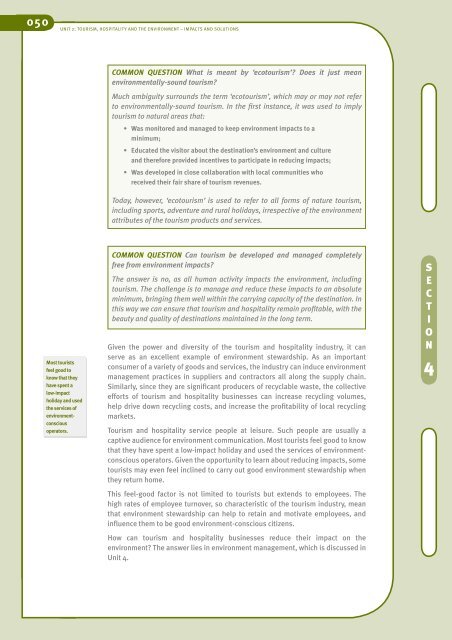Online version: PDF - DTIE
Online version: PDF - DTIE
Online version: PDF - DTIE
Create successful ePaper yourself
Turn your PDF publications into a flip-book with our unique Google optimized e-Paper software.
050<br />
UNIT 2: TOURISM, HOSPITALITY AND THE ENVIRONMENT – IMPACTS AND SOLUTIONS<br />
COMMON QUESTION What is meant by ‘ecotourism’? Does it just mean<br />
environmentally-sound tourism?<br />
Much ambiguity surrounds the term ‘ecotourism’, which may or may not refer<br />
to environmentally-sound tourism. In the first instance, it was used to imply<br />
tourism to natural areas that:<br />
• Was monitored and managed to keep environment impacts to a<br />
minimum;<br />
• Educated the visitor about the destination’s environment and culture<br />
and therefore provided incentives to participate in reducing impacts;<br />
• Was developed in close collaboration with local communities who<br />
received their fair share of tourism revenues.<br />
Today, however, ‘ecotourism’ is used to refer to all forms of nature tourism,<br />
including sports, adventure and rural holidays, irrespective of the environment<br />
attributes of the tourism products and services.<br />
Most tourists<br />
feel good to<br />
know that they<br />
have spent a<br />
low-impact<br />
holiday and used<br />
the services of<br />
environmentconscious<br />
operators.<br />
COMMON QUESTION Can tourism be developed and managed completely<br />
free from environment impacts?<br />
The answer is no, as all human activity impacts the environment, including<br />
tourism. The challenge is to manage and reduce these impacts to an absolute<br />
minimum, bringing them well within the carrying capacity of the destination. In<br />
this way we can ensure that tourism and hospitality remain profitable, with the<br />
beauty and quality of destinations maintained in the long term.<br />
Given the power and diversity of the tourism and hospitality industry, it can<br />
serve as an excellent example of environment stewardship. As an important<br />
consumer of a variety of goods and services, the industry can induce environment<br />
management practices in suppliers and contractors all along the supply chain.<br />
Similarly, since they are significant producers of recyclable waste, the collective<br />
efforts of tourism and hospitality businesses can increase recycling volumes,<br />
help drive down recycling costs, and increase the profitability of local recycling<br />
markets.<br />
Tourism and hospitality service people at leisure. Such people are usually a<br />
captive audience for environment communication. Most tourists feel good to know<br />
that they have spent a low-impact holiday and used the services of environmentconscious<br />
operators. Given the opportunity to learn about reducing impacts, some<br />
tourists may even feel inclined to carry out good environment stewardship when<br />
they return home.<br />
This feel-good factor is not limited to tourists but extends to employees. The<br />
high rates of employee turnover, so characteristic of the tourism industry, mean<br />
that environment stewardship can help to retain and motivate employees, and<br />
influence them to be good environment-conscious citizens.<br />
How can tourism and hospitality businesses reduce their impact on the<br />
environment? The answer lies in environment management, which is discussed in<br />
Unit 4.<br />
S<br />
E<br />
C<br />
T<br />
I<br />
O<br />
N<br />
4
















